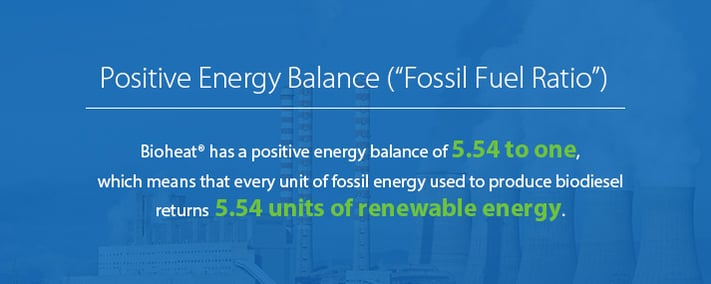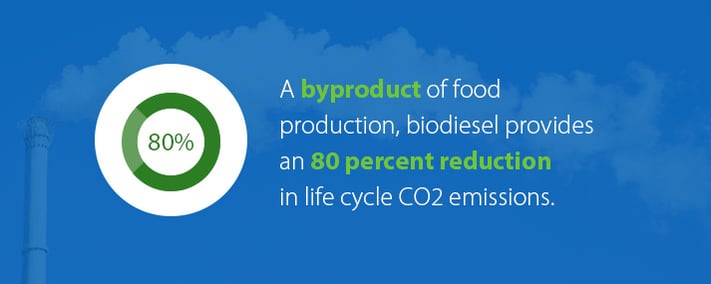
Long marketed as the “evolution of oil heat,” Bioheat® is a blend of traditional home heating oil and renewable biodiesel.
Bioheat® — a registered trademark of the National Biodiesel Board and the National Oilheat Research Alliance (NORA) — is a safe, clean, environmentally friendly fuel that heats cleanly, efficiently and reliably. It can also safely burn in most unmodified diesel engines. In the United States, Bioheat® has already been used as a blending stock for number two fuels for over a decade, and it has been used in Europe for over 20 years.
In 2011, U.S. biodiesel exceeded the EPA Renewable Fuel Standard target of 800 million gallons, reaching a one-billion-gallon milestone. The EPA projects production of nearly 12 billion gallons by 2020, although Bioheat® usage will likely meet this threshold sooner, given the growing popularity of the alternative fuel.
The Bioheat®/Biodiesel Blend
Biodiesel is a renewable energy source made from the fatty acids in soy, recycled restaurant oils, vegetable oils and other natural sources like palm oil, jatropha, camelina, seashore mallow, fungi and sea algae. Roughly 47 percent of biodiesel is made from soybean oil, 14 percent derived from corn oil and 13 percent from soybean oil. A chemical process called transesterification removes glycerin and fats, leaving purified methyl esters as biodiesel. Independent production facilities all over the United States collectively produce over two billion gallons of biodiesel a year.

BQ-9000 is a voluntary quality assurance program accrediting producers of biodiesel. The program’s certification ensures a quality process by all specifications. Although the ratio of heating oil to biodiesel varies, the most common combinations are B2 (two percent biodiesel), B5 (five percent biodiesel), B10 (10 percent biodiesel) and B20 (20 percent biodiesel). Pure biodiesel is called B100.
Over the years, petroleum companies, biodiesel manufacturers, engine companies, military representatives, government representatives and researchers helped develop biodiesel standards, making biodiesel fuel the only renewable diesel fuel with approved international specifications. These specifications help guide fuel preparation, engine design, quality checking and purchasing contracts.
In 2007, the U.S. Environmental Protection Agency (EPA) required all biodiesel intended for use as fuel to comply with the biodiesel specifications titled ASTM D6751. The EPA’s “Guidance for Biodiesel Producers and Biodiesel Blenders/Users” clarifies regulatory requirements concerning use as a motor vehicle diesel fuel additive. The EPA is working with standard-setting organizations to harmonize standards for biofuels at various concentrations.
Through ASTM D6751, the American Society for Testing and Materials (ASTM International) provides standard specifications for biodiesel fuel, prior to blending with conventional diesel type fuels. It prescribes the required properties of diesel fuels for delivery and at certain points in production and distribution. According to ASTM D6751, Bioheat® contains a minimum two percent to a maximum five percent biodiesel.
D6751 includes different limits for distillation and density, as well as test parameters such as total glycerin and free glycerin. It also includes a requirement to control minor compounds using a cold soak filterability test. ASTM International also outlines stringent stability parameters for B100 biodiesel used in BioHeat®, ensuring that Bioheat® has a minimum shelf life of six months.
Other relevant quality specifications include the following:
- ASTM D396 provides formal approval of B5 biodiesel as a fungible component in heating oil, for use on home heating and oiler applications. D396 provides specifications for a variety of climactic and operating conditions, depending on viscosity/boiling range and usage — domestic, commercial or industrial.
- ASTM D975 provides specifications for diesel fuel oils used for on-road and off-road applications, and has been revised to permit up to five percent biodiesel.
- ASTM D7467 provides specifications for B6 to B20 blends used for on-road and off-road diesel engines.
The U.S. oil industry hopes to use B5 interchangeably with standard heating oil, since the two items offer a similar performance, and no new equipment is needed for a switch from standard oil to B5. A number of states and municipalities are beginning to require biodiesel blends for many heavy-duty vehicles, like transit buses.

- Maine has been heating buildings with B10 since 2004.
- In 2009, Pennsylvania mandated that every gallon of on-road diesel sold in Pennsylvania must contain two percent biodiesel.
- In 2010, Connecticut signed into a law a requirement that all heating oil sold in the state contain less than 0.3 percent sulfur and at least 2 percent biodiesel.
- In 2012, the New York City Council, with the assistance of the New York Oil Heating Association (NYOHA), mandated the use of B2 blend Bioheat® for oil-heated buildings. At the time, this decision resulted in the replacement of 20 million gallons of petroleum with an equal volume of renewable, domestically produced biodiesel.
- In 2014, New York City issued a mandate to utilize a B5 biodiesel blend for the city’s fleet, and required a B20 blend from April to November beginning in 2016. The city plans to study the possibility of year-round usage of B20 for at least five percent of the city fleet. The city is also considering public biodiesel requirements that may impact private companies.
- In 2013, the state of New York passed legislation requiring all heating oil sold in the state to contain at least two percent biodiesel by 2015. The new regulations will replace 30 million gallons of petroleum with clean-burning, renewable fuel.
- Rhode Island enacted legislation to ensure that all of the state’s heating oil becomes Bioheat® by 2014. It became the first New England state to implement a statewide Bioheat® requirement.
- Massachusetts may mandate that home heating oil contain two percent biodiesel (B2), and may eventually increase that number to five percent.
Due to heating fuel mandates all over the country, biodiesel has been experiencing exponential growth.
Advantages of Bioheat®
Endorsed by the Oilheat Manufacturers Association and the National Oilheat Research Alliance, Bioheat® has many proven benefits.
Cost-Efficient
The costs of Bioheat® are similar to traditional heating oil, although slightly lower. Even when price differences aren’t considered, Bioheat® burns more efficiently and lasts longer due to the use of renewable energy components from soybeans and other plants.
Environmentally Friendly
Although home heating oil is clean-burning, low-sulfur fuel, biodiesel blends offer an even safer alternative fuel for heating that’s renewable, biodegradable and non-toxic.

- Aid Quality. Bioheat® offers reduced toxic gas emissions in comparison to petroleum diesel. In 2002, the EPA’s “Comprehensive Analysis of Biodiesel Impacts on Exhaust Emissions” determined that the impact of biodiesel on heavy-duty engines was as much as 50 percent reduction in carbon monoxide and almost 70 percent reduction of hydrocarbons. According to the EPA’s Renewable Fuel Standards Program in 2010, biodiesel from soy oil reduced greenhouse gases by 57 percent. Biofuel from waste grease provides an 86 percent reduction in greenhouse gases.
- Positive Energy Balance (“Fossil Fuel Ratio”). Bioheat® has a positive energy balance of 5.54 to one, which means that every unit of fossil energy used to produce biodiesel returns 5.54 units of renewable energy.
- Reduced Nitrous Oxide. Biodiesel offers higher cetane levels for more efficient ignition.
- Renewable. Bioheat® is a renewable energy source that reduces global warming gas emissions.
- High BTU Content. Bioheat® has the highest British Thermal Unit (BTU) content for any alternative fuel, containing 11 percent oxygen by weight.
- Virtually Sulfur Free. Bioheat® contains no nitrogen or offensive odors. When one uses biodiesel, nitric oxide, carbon monoxide, hydrocarbons, sulfur and particulate matter are reduced. B20 blends reduce CO2 emissions by 15.66 percent. Pure biodiesel would reduce carbon dioxide emissions by 78 percent, nitrated PAH’s by 80 percent, unburned hydrocarbons by 67 percent, carbon monoxide by 48 percent, particulate matter by 47 percent and sulfates by an impressive 100 percent.
- Healthy and Safe. Bioheat® passes the EPA’s tier 1 and 2 health effects. The biodiesel Tier 2 testing reported no significant exposure-related effects on food consumption, mortality, neuropathology, reproduction or ophthalmology.
- Suitable for Sensitive Environments. Bioheat® is non-toxic and is suitable for environments with children, seniors and pets. Bioheat® also requires a higher temperature to ignite and burn than heating oil does.
Works With Current Equipment
Bioheat® requires no equipment modifications or retrofitting and will work with standard oil heating equipment, boilers and diesel generators. Performance and properties are the same as current heating oil. In fact, the Underwriters Laboratories Inc. (UL) formally announced that equipment intended for Bioheat® complies with ASTM fuel standards.
High Lubricity
Bioheat® may have lubricating properties that can extend equipment life and require less equipment maintenance. It may also reduce HC, PM and CO in existing diesel engines. Because biodiesel contains no sulfur, it can be added to ultra-low sulfur diesel to assist with lubrication. Studies show that biodiesel may lose its lubricity over time, either due to increased moisture absorption or the oxidation of unsaturated molecules. Biodiesel’s high viscosity is another concern: This quality may make pure biodiesel likely to clog fuel filters and injectors at low temperatures.
Reduces Dependence on Foreign Oil
Bioheat® is made domestically from recycled resources, reducing U.S. dependence on foreign oil. Domestic production, as of 2011, created more than 31 thousand jobs for the U.S. economy, generating income of approximately 1.7 billion dollars. This translated to billions in GDP and 345 million dollars in federal tax revenues. There are currently over 200 biodiesel plants around the country producing a total of over three billion gallons of biofuel. The industry now supports more than 62 thousand jobs. Production increased from 25 million gallons in the early 2000s to 1.7 billion gallons of biofuel in 2014. This number is still a small percentage of the on-road diesel market of 35 to 40 billion gallons, but the industry has a goal of producing 10 percent of the diesel transportation by 2022.
Increases Food
In 2010, the U.S. Biodiesel produced from soybean oil produced soybean meal for 57 billion servings of protein used in global hunger programs. As demand for soybean oil to create Bioheat® increases, the cost of purchasing soybeans declines. This means more healthy proteins for an increasing world population.
A full transition to biofuels would require large tracts of land to produce traditional food plants. For the time being, the gradual transition to biofuels will use existing arable land until non-food crops become a more significant source for biofuels.
Under the Renewable Fuel Standard 2 (RFS2), the U.S. EPA declared biodiesel an “Advanced Biofuel.” Such fuels are produced on existing land and meet the minimum threshold of an over 50 percent reduction in life cycle carbon emissions when compared to petrodiesel.

A byproduct of food production, biodiesel provides an 80 percent reduction in life cycle CO2 emissions. Increasing soybean production to meet the demand for biodiesel helps meet our energy and food needs without drilling or using new land.
With the EPA’s commitment to safe and renewable fuel alternatives, biodiesel and Bioheat® production should continue to increase. With the oilheat industry distributing roughly seven billion gallons of heating oil, replacing standard oil with B5 oil could use up to 350 million gallons of domestically-produced Biodiesel. Blending seamlessly with heating oil, Bioheat® offers greater benefits for human health, performance and energy security, reducing our dependence on foreign oil as well as our carbon footprint.
How to Ensure Quality Fuel
Keep in mind that Bioheat® must be made with ASTM D6751 grade biodiesel. Products that don’t meet ASTM minimal standards are not biodiesel and could damage equipment. Only ASTM D6751 grade biodiesel provides reliable usage. You can ensure quality Bioheat® by only purchasing from companies certified under the biodiesel industry fuel quality program.
You can also ensure quality by inspecting fuel for cleanliness and haze, which may indicate the presence of wax or water. Suspended water in fuel can occur in any stages of fuel distribution.
If you know you have quality fuel, you must keep the fuel “on-spec” — this term describes fuel that retains the same ASTM quality while it’s stored. Make sure that fuel storage tanks are free of contaminants. You can protect your quality fuel with the following storage tank strategies:
- Keep tanks topped off.
- Monitor and eliminate water frequently.
- Have your tank periodically cleaned by trained professionals.
- Don’t use additives to treated fuel.
- Be aware of your fuel specifications and perform periodic sampling to ensure specifications are maintained.
- Have a lab run a microbiological evaluation of your fuel at least once a year to check for contamination.
- Find out the operability values of your fuel (e.g. cold filter plugging point, cloud or pour).
- If fuels are exposed to outdoor conditions, make sure tanks have heating elements and insulation.
Upgraded or new storage systems, properly maintained, should also help protect the quality of your ASTM grade Bioheat fuel.
Choose Smart Touch Energy
With pricing up to 40 cents below the EIA’s average prices, Smart Touch makes it easy to save money with heating oil. Our interactive website allows customers to manage accounts, track deliveries and place orders 24 hours a day. We currently provide heating oil to customers in New Jersey, Connecticut, New York, Massachusetts, Rhode Island, Maine, New Hampshire and Pennsylvania.
With Smart Touch, you have the assurance of many years of experience in the fuel industry. All of the local dealers in our extensive network are fully evaluated to ensure quality results and trustworthy support.
As an industry leader in safety, reliability and customer service, we’ve been selling high quality heating oil at competitive prices for years. Our Bioheat® blends are made only with ASTM D6751 grade biodiesel, the safest and most efficient heating oil available for home use. With no new equipment to buy, switching from number two oil has never been easier.



